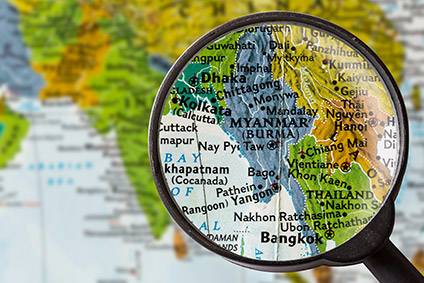
Unions have called for the European Union (EU) to suspend the Everything But Arms (EBA) agreement with Myanmar, given the garment industry remains “a vital source of foreign exchange” for the regime.
In a further call for the EU to “take stronger action” against the military junta in Myanmar – a key sourcing destination for many European clothing brands – IndustriAll Global Union says “there is no way to do business in Myanmar without doing harm to the people and workers”.

Discover B2B Marketing That Performs
Combine business intelligence and editorial excellence to reach engaged professionals across 36 leading media platforms.
“We are urging the European Union to immediately suspend the EBA arrangement with Myanmar,” says Luc Triangle, general secretary for IndustriAll Europe.
‘’The message from garment workers in Myanmar to the EU is clear. Take action, suspend the EBA agreement, and cut off vital funds to the terrible military junta. We expect the EU to act responsibly and to act now.’’
IndustriAll Global Union and industriAll European Trade Union say the EU’s EBA trade scheme provides Myanmar with beneficial trading tariffs, in “blatant disregard” of the EU Generalised Scheme of Preferences’ (GSP) own regulations, which state that beneficiary countries must respect the principles of fifteen core conventions on human and labour rights.
According to IndustriAll, most trade unions in Myanmar are banned, union leaders have been arrested or are in hiding. It says the jobs facilitated by EBA are “in no way decent jobs”, respecting fundamental labour standards, and IndustriAll’s affiliate, Industrial Workers Federation of Myanmar (IWFM), compares the conditions to modern slavery.

US Tariffs are shifting - will you react or anticipate?
Don’t let policy changes catch you off guard. Stay proactive with real-time data and expert analysis.
By GlobalDataIn May, the Ethical Trade Initiative (ETI) urged fashion brands to refrain from making any additional investments in Myanmar, with claims the human rights situation in the country continues to deteriorate.
The State Administration Council (SAC) has banned 16 labour organisations from operating, while the Action, Collaboration, Transformation (ACT) Initiative, a global agreement between trade unions and brands to achieve living wages, withdrew from Myanmar in December 2021, as a result of its trade union partner, the Industrial Workers Federation of Myanmar (IWFM), stating that it could not operate freely in the country under the current circumstances.
“Myanmar is facing profound and well-documented violations of UN and ILO Conventions included in the GSP/EBA regulations, by multinational companies and brands, among which 61 EU well-known fashion brands,” says Khaing Zar, IWFM president.
“Respect for the Conventions are conditions for maintaining the EBA and the workers’ rights need a prompt and effective response by the EU.”
According to IndustriAll, the garment industry remains a vital source of foreign exchange for the regime. IndustriAll’s campaign demands that brands cease production in Myanmar, pointing out the discrepancy between their immediate withdrawal from Russia after the invasion of Ukraine, and their continued presence in Myanmar.
The union says that despite the human rights situation in Myanmar since the coup in February 2021, most garment brands continue to source from the country; it believes often in breach of their own codes of practice.
“The brands claim their presence does not benefit the military and provides employment, but they provide important foreign exchange, as well as income to the regime in the form of taxes and duties,” the union explains.
IndustriAll gGeneral secretary, Atle Høie, adds: “There is no decent work in a country ruled by a military regime and where unions cannot operate.”
Just Style contacted the European Commission for comment but did not receive a response at the time of going to press.
This article was first published by IndustriAll.





